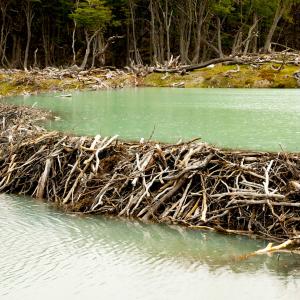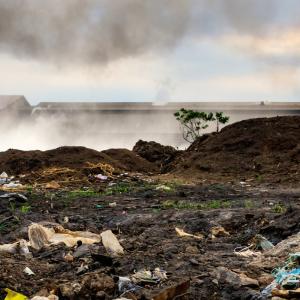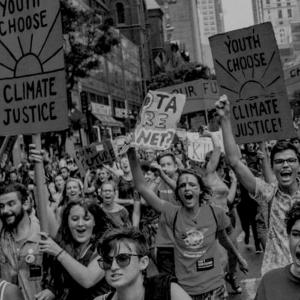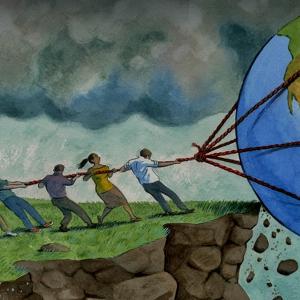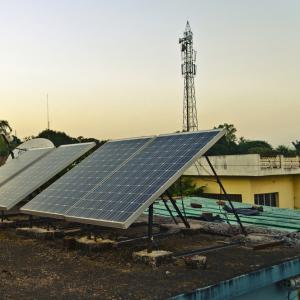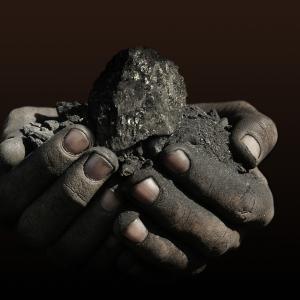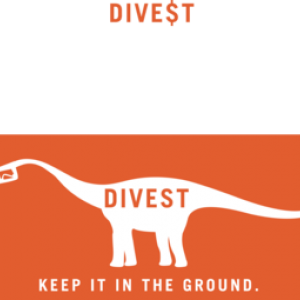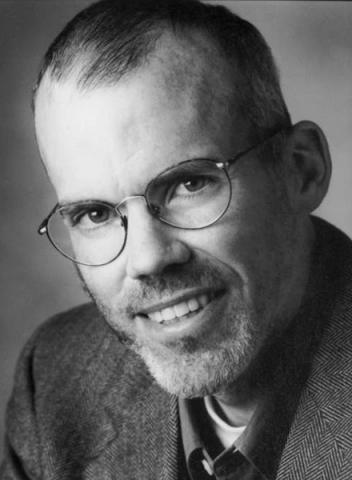
Bill McKibben, co-founder of 350.org, is the author most recently of The Flag, the Cross, and the Station Wagon: A Graying American Looks Back at his Suburban Boyhood and Wonders What the Hell Happened. He is the Schumann Distinguished Scholar at Middlebury College in Vermont and one of the Sojourners contributing editors.
Posts By This Author
Leave it to Beavers
On a continent increasingly beset by climate-caused drought and flood, beavers couldn't be more important.
IN THE REMARKABLE speech that God delivers beginning in Job 38—God’s longest soliloquy in the Bible, Old Testament or New—we hear of the mountain goat, the raven, the lioness, even the wonderfully silly ostrich, redeemed by her wild speed. But nothing of the beaver! Doubtless this is because Job, confined to the old world, had not come across Castor canadensis, and so God did not want to confuse him (Job was freaked out enough already). But if God had been aiming at a North American audience, there is no doubt the beaver would have starred in the account, because there may be no finer creature under heaven.
Keystone: The Fight Continues
When will construction begin? Well, that depends on Nebraska.

Dave Weaver / Shutterstock.com
OF ALL THE unlikely battles still to be raging, the fight over the Keystone XL pipeline has to be about the unlikeliest.
It was a long shot in the summer of 2011, when the national fight really began. Though a hardy corps of ranchers in Nebraska were already battling, and though Indigenous activists in Canada had been spreading the word about its source in the tar sands, it was all but unknown on a national basis.
What Would Sitting Bull Do?
Let us put our minds together to see what kind of future we can make for our children.
AS SUMMER drew to a close, one of the great dramas in the planet’s ongoing environmental uprising erupted in a remote place, the Standing Rock Sioux reservation that straddles the border of North and South Dakota. The Army Corps of Engineers had approved plans for “fast-tracking” the Dakota Access pipeline, which would carry crude from the Bakken shale of North Dakota west to Illinois and then south to Gulf refineries. The pipeline was mostly on private land, and the company had gotten most of the necessary approvals from pliant state officials—but it had to cross the Missouri River somewhere.
The original plans had called for that crossing to happen just above Bismarck, a mostly white North Dakota city. But there had been concern about what would happen to the town’s water supply in the event of a leak, so the map had been redrawn, to take the pipe across the river just above the Sioux reservation. And the Army Corps had signed off on the plan—even though three other federal agencies, including the EPA, had raised serious objections. Just another day in the ongoing saga of environmental injustice that haunts this nation.
Except that this time something unexpected happened. The local Sioux said no: They erected an encampment blocking access to the construction work. And their message spread: White environmentalists joined them, as well as a crew from Black Lives Matter, but mostly other native Americans poured in, from all across the West—representatives of as many as 200 different tribal nations, according to reports. Chief Harry Goodwolf Kindness of the American Indian Movement commented that it has been well over a century since people from so many tribes had engaged in such joint action. “First time since the Battle of Greasy Grass,” he said, “so it’s been a long time.”
How Sweet the City Can Be
A challenge is to build urban areas in ways that people of all type can enjoy their pleasures.
I HAD A REAL New York City sojourn on a recent weekend, one that reminded this longtime country dweller how sweet the city can be.
It began on Friday night at the IFC Center downtown, watching a premiere screening of the pilot of the new HBO series The Deuce, which is set on 42nd Street in 1971. Though I didn’t get to New York until the early ’80s, the street scenes in the show were familiar—the grit and violence and general decay lingered at least through the crack years of the mid-1980s; when I left New York, 42nd Street remained a canyon of porn theaters and massage parlors. (The Deuce, by the way, is brilliant—Maggie Gyllenhaal is unforgettable as the complicated lead.)
There Are None So Blind...
The fossil-fuel industry has been running a disinformation game for more than a quarter centry.
WE ARE TOLD, in the classic story of Oedipus, about the king who managed to bring devastation to his city and family, a king who, when he finally learned the truth of his crimes, blinded himself.
I thought of that epic tragedy when I read of one decision by our current ruler, one event amid all the dozens of others. And this one was less immediately tragic—it didn’t involve pulling an immigrant with a brain tumor out of a hospital for deportation, nor forcing transgender Americans to produce a birth certificate before they pee. No, this tragedy will play out over a longer time.
In early March (and, of course, late on a Friday afternoon), his new team at the Commerce Department announced that they intended to cut the climate satellite program at the National Oceanic and Atmospheric Administration by 22 percent. They proposed a lot of other terrible cuts the same day: virtually zeroing out the environmental justice programs at EPA and cutting the environmental education budget by 94 percent. But the one that future historians will, I think, obsess over is the satellites.
Consider: In the last few months, we’ve learned that 2016 set the all-time record for the hottest recorded year on planet earth. We’ve seen, over the last few years, the highest wind speeds ever recorded in one ocean basin after another, as record-hot water produces amped-up hurricanes. An iceberg a quarter the size of Wales (not a whale—Wales) is about to break off from the Larsen Ice Shelf in the Antarctic. And we’re going to blind ourselves? We’re going to start paying less attention?
The Politics of the Post-Millennial Generation
A rising tide of youth electoral organizing is pushing back against disappointing politicians.
IF YOU'RE LOOKING for the climate movement this year, you’ll find it at city councils arguing for 100 percent renewable energy, at pension boards demanding fossil fuel divestment, and in farm fields trying to block pipelines. But you’ll also need to track down a few ramshackle houses in swing states across the country.
Those houses will hold hundreds of young people—at least it will hold them late at night, once they’re done with the long work of knocking on doors, handing out voter guides, and going to rallies. These “movement houses” are the most visible face of the Sunrise Movement, one of those reminders that even the poisonous politics of our moment holds real possibilities.
The young people who founded Sunrise weren’t actually anticipating a Trump victory. “We had had a plan to focus on building popular support for climate change, anticipating that a Democratic president would be pushed to take action on climate if a majority of Americans wanted it and made enough noise,” Varshini Prakash, the group’s engaging spokeswoman who cut her teeth as a highly successful divestment activist at UMass Amherst, said in an interview last summer. But then came that fateful November day, and “our world turned upside-down.” Now it wasn’t about pushing Clinton harder—it was about pushing back against the desperate threat that Trump represented: to the Constitution, to vulnerable people, and to the climate, which can’t wait a decade or two for sanity to return to our national life. “When the dust settled we came to an important realization: We have to figure out how to win elections.”
Like a Good Neighbor
No one ever met a new friend at Amazon.

Image via Shutterstock/Jeramey Lende
A SPORTING GOODS store in a nearby town announced last week that it was closing, after many years of operation. Here’s why I think that matters, even amid all the rest.
Yes, we are living through a terrible moment in American (and planetary) history. Almost every day features two things: More cruel tweeting from the president, and more unsettling data from the real world. It is a bizarre and disheartening mix: record meanness and crudity, record windspeeds and temperatures.
We must resist, of course, and we are: The ongoing mobilization of people of good conscience is the one sweet thing about these past months. We look toward, among other things, the midterm elections as a moment when we might start to pull out of the nosedive. But resistance will not, even at its most successful, entirely erase our problems anytime soon. Long before Trump we were facing impossible inequality and impossible ice-melt. Along with resistance, we need ... neighbors.
Neighbors were optional for much of the last 50 years. We became hyper-individualists—surveys show that three-quarters of Americans have no relationship with their next-door neighbors, which is a novel situation for humans. But in the next 50 years, we’re going to need our neighbors again. The fat years are past and the lean years are upon us—even as we try to rebuild our planet against the predations of the rich and powerful, we’re going to require stronger communities for sheer survival. Ask the people trying to recover from Hurricane Harvey, from Maria, from the firestorm that raked California.
Earth's New Vulnerabilities
We're starting realize how unbuffered the whole planet is.
ONE OF THE conceits of modern life is that it’s always going to work out, always going to be okay. Indeed, it’s going to be better than it ever was. But the world is testing that idea.
When Hurricane Maria slammed into Puerto Rico—its buzz-saw eye ripping from one end of the island to the other—it changed almost everything in the course of a few hours. Gone were airports and roads. Eighty percent of the island’s crops were destroyed—think of that. Almost all the cell towers: There were profound images of groups of people standing in fields where the few remaining transponders would catch a signal, desperately trying to phone friends and family. Electricity was suddenly a thing of the past, and in places likely to stay that way for six months or a year. And when you lose electricity—well, there goes AC, not to mention ice. The concept of cold disappears for a while. Modernity retreats.
Envisioning a 50-Year Future
"Soon" and "urgent" are words that can keep us from seeing the deep roots of problems - and solutions.

Paladin12 / Shutterstock
WE LURCH FROM ecological crisis to crisis, all of them real: So far this year we’ve seen the sickening collapse of much of the Pacific’s coral in a 10-month blitz of hot ocean water; we’ve watched a city of 90,000 evacuated ahead of a forest fire so big it was creating its own weather; and we’ve witnessed the earliest onset of widespread Arctic melting ever recorded. And so on.
All of these need urgent responses—the fire company has to report for duty. So it’s been sweet to see activists doing civil disobedience on an unprecedented scale around the world and increasingly putting the fossil fuel industry on the defensive. We’ve got to turn the tide soon.
But “soon” and “urgent” and “emergency” are words that can blind us as well—keep us from seeing the deep roots of problems and solutions. So it is a very good thing that we have some folks who don’t scare easily. I’m thinking in particular of Wes Jackson and Wendell Berry, who keep patiently pushing the most deeply (and literally) rooted piece of legislation I know of, the 50-year Farm Bill.
The Kansas geneticist and farmer, and the Kentucky writer and farmer, begin with the premise that roots are important. Our industrial agriculture has plowed up the perennial crops that once covered the continent (and the planet) and replaced them with high-yielding annuals. All that wheat and corn feed us cheaply—and lead to dead, eroding soils that, among other things, can’t soak up much in the way of carbon. So Jackson, at his Land Institute, has spent the last decades crossing annual and perennial crops. The goal is nothing less than grains you don’t need to replant every year—grains that will grow deep, tangled roots into the prairie soil, feeding us and restoring a desperately needed balance.
Signs of Things to Come
If you're not afraid of what we've unleashed, its because you're not paying sufficient attention.
FOR THOSE PAYING attention, this has been a fairly terrifying winter and spring. And I don’t just mean the presidential election. I mean that the signals we’re getting from the natural world indicate we’re crossing thresholds much more quickly than expected.
February, for instance, was the most anomalously hot month ever recorded on the planet, crushing all records. The world had pledged in Paris in December to try to hold global temperature increases to 1.5 degrees Celsius—well, February was just about at that level already.
The elevated temperatures were especially noticeable in the Arctic—for long stretches of the winter the region as a whole was as much as 18 degrees Fahrenheit above average. (Christmas Eve was almost 50 degrees warmer than normal at the North Pole). Not surprisingly, this meant the lowest levels of Arctic sea ice ever recorded by late March.
Meanwhile in the Antarctic, new data showed that sea level may be set to rise far faster than expected, as the great ice sheets start to slide into the ocean—the water could go up by meters in the course of this century, which would make the defense of most of the world’s great cities a nightmare.
Zika and Climate Change
In El Salvador, the health minister said it would be at least 2018 before it would be safe to get pregnant.

mycteria / Shutterstock
WE SPEND, in the Christian tradition, a fair amount of time meditating on Mary as she waited to give birth.
But maybe this month it would be a good idea to meditate on the millions of women around Latin America and the Caribbean who are waiting to give birth—and doing so in a state of quiet panic.
Health ministers in countries such as Jamaica, Colombia, and Brazil were telling their (enormous) populations to avoid becoming pregnant. To avoid reproduction. To avoid the most basic task of any species. In El Salvador, the health minister said it would be at least 2018 before it would be safe to get pregnant. Think about that.
The culprit is a new disease, the Zika virus, which is mainly spread by mosquitos.
Not quite new, actually—it was found in Africa decades ago. But it’s migrated to South America, perhaps during soccer’s 2014 World Cup. And it appears to be having an entirely new effect. Though innocuous enough to those who catch it (flu-like symptoms so mild that most people don’t even know they have it), it appears linked to a truly horrendous set of birth defects. In a normal year, Brazil has a couple of hundred cases of microcephaly, an incurable birth defect that may result in intellectual disabilities, seizures, and reduced life expectancy. In 2015, that number suddenly jumped to 4,000, and the best guess is that the Zika virus is the culprit.
Exxon's Criminal Offense
The damage Exxon has done will keep on accelerating for centuries to come.
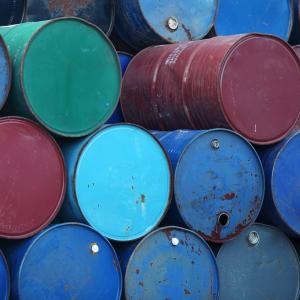
sakhorn / Shutterstock
TWO RECENT news items: 1) A new U.N. report finds that over the last 20 years, 4.1 billion people have been injured in extreme weather events—the floods and forest fires that are proliferating as the climate warms. The report adds that the total will keep steeply climbing in the years ahead.
2) Two teams of investigative journalists, following separate document trails, proved in the course of the fall that Exxon—now ExxonMobil, the world’s most profitable company—had known everything there was to know about climate change 25 years ago. And then lied about it, helping to set up the elaborate infrastructure of climate denial that has prevented serious international action on global warming.
I don’t know how to keep these two things in my head at the same time without giving myself over to hatred. I know I’m not supposed to hate, and much of the time I’m able to work on climate change without losing my cool. I can meet oil industry executives, understand the problems that make it hard for them to move quickly; I can and do sympathize deeply with coal miners and tar sands miners whose lives will be disrupted as we take necessary action.
But for Exxon? There have been hours, reading these reports in the Los Angeles Times and the Pulitzer-winning InsideClimate News, when I’ve just found myself in a blind rage, unable to comprehend how people—professed Christians, most of them, in that Texas hotbed of Christianity—could act this way. Their scientists told them quite straightforwardly that burning coal and oil was heating the planet and that it was going to be disastrous. By the mid-1980s, before any politician was talking about climate change, they had good computer models indicating (correctly as it turned out) how much the earth would warm. And they believed those predictions—they helped guide their actions in places like the Arctic, where they were bidding for leases in waters they knew would soon be free of ice.
But they also knew that serious action on climate change would cost them money—would force them to start switching their business from fossil fuel to renewable energy. And so they went to work, helping to set up front groups that hired veterans of the tobacco wars to open a new front of obfuscation. Their CEO, Lee Raymond, gave a speech in Beijing in 1997 insisting that the climate models were hokum, and that the earth was cooling.
A Planet Worth Fighting For
While world leaders drag their feet on meaningful carbon limits, climate activists begin to turn the tide against the fossil fuel industry
THOSE OF US who work on global warming are well-defended against even moderate optimism. Every day brings another study showing how far we’ve pushed the planet’s physical systems. For instance, new research has emerged showing that even as the planet is setting remarkable temperature records, the meltwater pouring off Greenland has cooled a patch of the North Atlantic and perhaps begun to play havoc with the Gulf Stream. Simultaneously, new research showed that the soupy hot ocean everywhere else was triggering the third planet-wide bleaching of coral in the last 15 years. It is entirely possible we’ve set in motion forces that can’t be controlled.
That said, for the first time in the quarter-century history of global warming there’s room for at least some hope in the arena we can control: the desperate political and economic fight to slow the release of yet more carbon into the atmosphere. It’s not like we’re winning—but we’re not losing the way we used to. Something new is happening.
Consider where we were six years ago, as the Copenhagen conference, much ballyhooed and long anticipated, ground to its dreary conclusion: The world had decisively decided not to decide a thing. There was no treaty, no agreement, no targets, no timetables. In fact, the only real achievement of the whole debacle was to drive home to those who cared about the climate that a new approach was needed. Twenty years of expert panels and scientific reports and top-level negotiations had reached a consensus that the planet was dangerously overheating. And it had also reached a dead end.
There was a reason for that, or so some of us decided: The fossil fuel industry simply had too much power. The fact that they were the richest industry in the planet’s history was giving them total power. They’d lost the argument but won the fight.
And because the rest of us were still arguing, not fighting, there was no real pressure. World leaders could go home from Copenhagen without fearing any fallout from their failure. Barack Obama came back to D.C. where he watched mutely as the Senate punted on climate legislation, and then mostly ignored the issue for three years, not even bothering to talk about it during his re-election campaign.
The Pope's Divisions
This is the most remarkable religious document in a generation.

Jenny Zhang / Shutterstock
THE POPE'S “climate change encyclical,” Laudato Si’ (“Praise Be to You”), is actually far more than that: It is the most remarkable religious document in a generation, offering a powerful and comprehensive worldview that is consonant with the Bible and hence profoundly countercultural. You owe it to yourself to take a few hours and read it slowly and carefully; you’ll be enlightened, but mostly, if you’re like me, you’ll be reassured. Reassured that someone powerful in this world actually sees our time for what it is, and understands the crises facing our planet for what they are.
Near the beginning, for instance, the pope discusses the “rapidification” of life, the sense that “the speed with which human activity has developed contrasts with the naturally slow pace of biological evolution. Moreover, the goals of this rapid and constant change are not necessarily geared to the common good or to integral and sustainable human development. Change is something desirable, yet it becomes a source of anxiety when it causes harm to the world and to the quality of life of much of humanity.”
That’s as useful a description of the last 100 years as we’re likely to get, that sense of life out of balance. It affects the poor, yes, and the pope is always most mindful of the poor—but it also affects everyone. The ever-more-technologized world we inhabit no longer makes us happier. It makes us stressed.
Empowering the World
Fifteen million Bangladeshis already live in solar-powered houses.
ONE OF THE most destabilizing facts of the last five years is this: The price of a solar panel has fallen 75 percent. The engineers have done their job, and that offers many possibilities.
We usually look at what the developed countries are doing with renewable energy, such as the fact that there were days during summer 2014 when Germany was generating three quarters of its power from solar panels (Germany!). But the most amazing miracles—and it doesn’t really stretch the word “miracle”—are happening in the poorest places, where for the very first time lights are blazing on.
Take rural Bangladesh, where fossil fuel has barely penetrated in the 200 years of its ascendancy in the West. There’s no grid—at night it just goes dark. Until the last few years, when low-cost solar panels and innovative financing arranged by groups such as the Grameen Bank have allowed the very rapid spread of solar panels. How rapid? As many as 80,000 new connections a month, which is far more than in the United States. Fifteen million Bangladeshis live in solar-powered houses already, and the government is hoping to have the entire nation hooked up by 2020.
Despair is Optional
We're like the bad babysitter who takes the 2-year-old out for a tattoo and some piercings.
AS POPE FRANCIS prepares to release his encyclical on climate change, it’s worth remembering exactly how far the conversation on religion and the environment has come in the past quarter-century.
When I wrote The End of Nature back in the late 1980s, there was very little religious environmentalism. Liberal churches believed that ecology was a subject to be addressed once you’d finished with war and poverty; conservative churches viewed it as a way station on the road to paganism. And Christians in general still reeled under the idea, propounded by Lynn White in an influential essay in Science magazine, that the Genesis call for dominion had led directly to the destruction we saw around us.
In those early days, there were a few wayfarers on this path. Thomas Berry, for instance, and even more important a pair of academics—Mary Evelyn Tucker and John Grim—who picked up his clues and sweated blood to assemble theologians from around the world and search every tradition for the roots of ecological thinking. Episcopal Power and Light—now Interfaith Power and Light—was an early and successful effort at congregational action; Shomrei Adamah (Guardians of the Earth) was an early effort in the Jewish community that has blossomed into many flowers.
Every Time I Look Into the Holy Book
Churches are profiting from desecration like this—and every time they look into the account books they should tremble.
I HAVE SOMETIMES been dismayed by the lack of speed that some churches and denominations have shown when it came to tackling environmental issues. On the question of divestment from fossil fuels, for instance, the Unitarians have been forthrightly in favor, and the United Church of Christ as well (and the Rockefellers!). But the Methodists, Lutherans, Presbyterians, and Anglicans are, by and large, dragging their feet as usual.
Sometimes I confess to imagining that God herself might be getting a bit impatient, too—how else to explain the name of the site for the next great fossil-fuel battle?
It will happen in Australia’s Galilee Valley, a remote basin many hours from the continent’s cities. At the moment it’s basically untouched, but plans call for it to become The Biggest Coal Mine on Earth. There is enough coal beneath its soil to provide 6 percent of the carbon that would take us past the two-degree rise in temperature scientists have given as the ultimate red line. That is to say, one valley in one nation (a nation with one-third of 1 percent of the planet’s population) can do 6 percent of the job of wrecking the planet. One valley!
An End to the Fossil-Fuel Era?
Now that the Rockefellers have divested, what excuse does anyone else have?
THE MOOD ALONG Central Park West couldn’t have been sweeter: As block after block after block of scientists and students and clerics strolled by on the People’s Climate March, everyone was smiling. Serious, yes—but calm. Determined, but hopeful. It was a coming out party, and everyone was reassured to see how big and broad this movement actually was.
And everyone was relieved, I think, not to have to listen to speeches. Without politicians explaining what the day was all about, the march was able to speak for itself, with a mix of anger and inspiration exemplified by the front- line communities and Indigenous nations that filled out the first ranks of the procession.
That night, though, there were a couple of speeches worth listening to. They came further up the West Side, at the Cathedral of St. John the Divine, where religious leaders had gathered for a series of meetings and services. At the reception following those talks, Stephen Heintz, the head of the Rockefeller Brothers Fund, cued up a video address from Desmond Tutu, calling for “an end to the fossil-fuel era.” Dressed in his scarlet robes, Tutu saluted activists, saying “the destruction of the Earth’s environment is the human rights challenge of our time,” and demanded that institutions around the planet end their investments in fossil-fuel companies.
The Problem of Big and Small
Hunkering down is deeply attractive, but we have work to do first.
IT'S REASONABLY clear to me that the natural tendency of our society at this moment is toward smallness, localness, and intimacy. After several centuries of constantly extending our supply lines around the world so that our food and our energy and our capital came from every corner of the planet, we find it increasingly pleasing and increasingly necessary to hunker down.
Local food is the best example. Our best restaurants and our sharpest cooks are no longer concerned with copying French recipes; for a generation now it’s been all about what’s close to home. Farmers’ markets have been the fastest growing part of our food economy, and suddenly there are more breweries than there were before Prohibition. It tastes good; it feels neighborly.
Next on the agenda: local energy. All of a sudden it seems weird to be piping stuff in from Saudi Arabia, or even Texas, when there’s plenty of good sunshine to be had close to home, when the wind blows over your house more days than not. In the wake of the financial crisis, there’s even a move toward Slow Money and local banking. It’s possible to imagine how it might all fit together into something quite beautiful—a new/old world that actually kind of works, instead of the careening one we’re used to.
Time for Confession—and Action
We stood by as our addiction to fossil fuel ran Genesis in reverse.
THE NEWS IN mid-May was grim: Scientists announced that melt across the West Antarctic was proceeding much faster than before. In fact, they said that at this point the melt of the six great glaciers fronting Amundsen Bay was “unstoppable,” and that over a number of decades it would raise sea levels by 10 feet or more.
This is another way of saying: Given dominion over the earth, we’ve failed. We’ve taken one after another of the planet’s great physical features and wrecked them. The Arctic? Summer sea ice is reduced by 80 percent, and it’s an every-year affair now to boat through the Northwest Passage, impassably choked by ice until this millennium began. The seven seas? Thirty percent more acidic than they were in the past—and the acidity could double or triple by the end of the century. The Antarctic? It’s not just warming rapidly, but its wind patterns have been changed by the ozone hole in ways that amplify the heating. Storms are stormier, droughts are deeper, fires last longer, rain falls harder.
And all because it was a little easier and a little cheaper not to change off fossil fuels. When scientists sounded the alarm about all this in the late 1980s, the atmospheric concentration of carbon dioxide was about 350 parts per million—or what we now consider the upper bound of safety. If we’d heeded their fervent warnings, we’d have moved with great speed to convert to solar and wind power. We’d have parked our SUVs. We’d have insulated every home in the world. It would have cost money and it would have been inconvenient; on the other hand, it could have bred solidarity in much the same way that preparing for World War II transformed the U.S.
